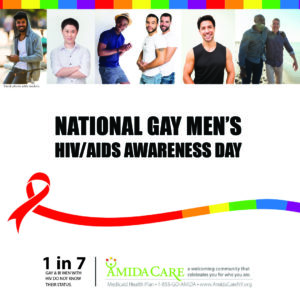National Gay Men’s HIV/AIDS Awareness Day: Stay Informed, Stay Healthy

Gay and bisexual men continue to be the population most affected by HIV and AIDS, making up over 65% of new HIV diagnoses in the U.S. and representing an estimated 26,000 of new HIV diagnoses annually. Though there has been progress in fighting the epidemic — with the rate of new HIV diagnoses remaining stable in recent years among gay and bisexual men overall— diagnoses have increased more than 10% among Latino men who have sex with men (MSM), and over 30% among African American MSM aged 25 to 34, according to the Centers for Disease Control (CDC).
On September 27, National Gay Men’s HIV/AIDS Awareness Day (NGMHAAD), we focus on the continuing impact of the HIV/AIDS epidemic in this community, while acknowledging that we now have powerful tools including PrEP (pre-exposure prophylaxis) and PEP (post-exposure prophylaxis) that can help end the epidemic in the United States.
In 2017, according to the CDC, Black gay and bisexual men accounted for the largest number of new HIV diagnoses (9,807). Stigma, fear, discrimination, and homophobia are factors that place many African Americans at higher risk for HIV. In addition, socioeconomic issues result in worse health outcomes among African American gay men. Barriers to quality health care, housing, and HIV prevention education increase the risk for HIV and lead to lower rates of viral suppression.
What Can Be Done?
Get Informed:
The CDC’s Start Talking. Stop HIV. campaign focuses on gay and bisexual men, encouraging open communication between sex partners and friends about HIV prevention strategies.
Get Tested:
An HIV test should be part of routing health care. 1 in 6 gay and bisexual men are not aware that they are living with HIV. Knowing your status is the first step to staying healthy. Free or low-cost tests are available for anyone 12 and older at NYC Sexual Health Clinics, regardless of immigration status. Visit the NYC Department of Health for more information.
Get Treatment:
If you have tested negative for HIV, consider PrEP which is more than 90% effective in preventing HIV transmission. Find a provider in your area with the CDC’s PrEP locator. PEP can also prevent HIV by taking a short course of drugs, usually for a month, after a high-risk exposure.
Those who test positive for HIV should discuss treatment options with a health care provider as soon as possible as the first step to staying healthy. In recent years, it’s become clear that people with HIV who achieve and maintain an undetectable viral load through treatment cannot sexually transmit the virus to others (U=U). Click here for more information on treatment and where to get it.
Resources
- Start Talking. Stop HIV.
- GMHC
- Living with HIV Basics
- NYC Department of Health
- NYS Department of Health
Amida Care can also help. Amida Care is a Medicaid Special Needs Health Plan (SNP) that currently serves 7,500+ members throughout the five boroughs of New York City, including people living with or at elevated risk for HIV. Please contact us at 1-855-GO-AMIDA to be directed to more health resources.
